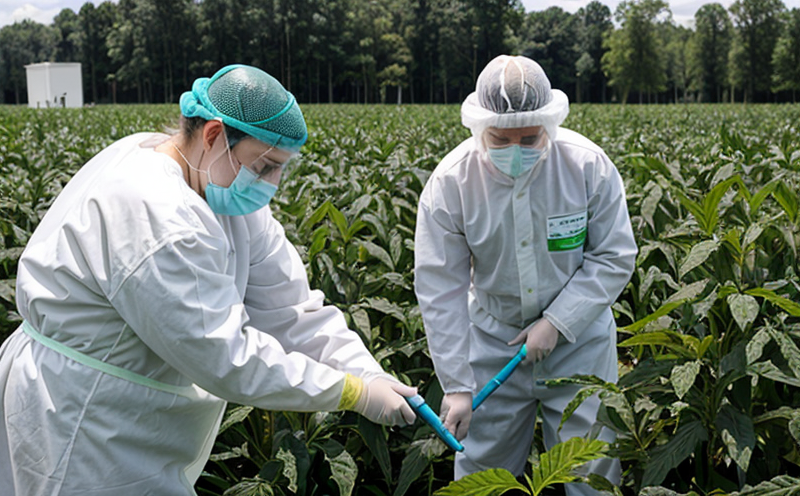FAO Efficacy Testing of Beneficial Microbial Agents
The Food and Agriculture Organization (FAO) efficacy testing of beneficial microbial agents is a critical process ensuring the safety, effectiveness, and regulatory compliance of biocontrol agents and beneficial microorganisms. This service aims to evaluate the biological control capabilities of these agents in agricultural contexts. The FAO standards are widely recognized globally for their stringent requirements on biopesticide and biocontrol agent development.
The testing is designed to identify the specific benefits of beneficial microbial agents, such as their ability to suppress plant pathogens, enhance soil health, or improve crop yield. The process involves a series of steps that include initial screening, controlled laboratory trials, greenhouse trials, and field studies. Each step ensures that only the most effective and environmentally friendly agents pass through to commercialization.
The FAO testing protocol is based on international standards such as ISO 17266 for biocontrol agent efficacy evaluation and EN 45309-1:2018 for biopesticide quality assurance. These standards provide a framework that ensures the tests are repeatable, reproducible, and reliable.
The testing process begins with an in-depth review of the microbial agents' properties, including their mode of action against target pathogens, their environmental impact, and potential for resistance development. This preliminary assessment is crucial to ensure that only viable candidates proceed to further trials.
Controlled laboratory trials are conducted under standardized conditions to evaluate the agent's efficacy in a contained environment. These trials typically include inoculation tests where the biocontrol agents are exposed to known pathogens and their performance is monitored over time. The results of these trials provide critical data on the agent’s ability to suppress pathogen growth.
Greenhouse trials follow laboratory trials, providing a more realistic assessment by simulating field conditions. These trials involve growing plants in controlled environments where biocontrol agents are applied and their effects observed. This step is essential for assessing the practical efficacy of the agents under semi-field conditions.
The final phase involves extensive field studies to evaluate the agent's performance in real-world scenarios. Field tests are conducted across various geographic locations with diverse climatic conditions, ensuring that the biocontrol agents perform consistently and effectively across different environments.
Throughout these trials, rigorous data collection methods ensure accurate and reliable results. This includes monitoring plant health indicators such as leaf chlorophyll content, root growth, and yield parameters like biomass production and fruit quality.
The testing process also involves comprehensive analysis of the microbial agents' safety profile. This ensures that they pose no harm to non-target organisms or human health. The FAO standards emphasize the importance of reducing environmental impact by minimizing the use of chemical pesticides and promoting sustainable agricultural practices.
Once all trials are completed, detailed reports are prepared summarizing the findings from each stage of testing. These reports provide a comprehensive overview of the biocontrol agent's efficacy, safety profile, and potential for commercialization. The results help stakeholders make informed decisions about the adoption of these agents in agricultural practices.
The FAO efficacy testing service is not just limited to evaluating new microbial agents; it also provides support for existing products seeking re-registration or enhanced claims. This comprehensive approach ensures that biocontrol agents meet the highest standards of safety and effectiveness, contributing to sustainable agricultural development worldwide.
Benefits
- Comprehensive evaluation ensuring compliance with international standards such as ISO 17266 and EN 45309-1:2018.
- Rigorous testing process encompassing laboratory, greenhouse, and field trials to ensure real-world efficacy.
- Support for re-registration or enhanced claims of existing biocontrol agents.
- Promotion of sustainable agricultural practices by reducing the reliance on chemical pesticides.
- Accurate data collection methods that provide reliable results critical for informed decision-making.
- Expert analysis of safety profiles to ensure minimal environmental impact and no harm to non-target organisms.
- Detailed reporting summarizing findings from each stage of testing, providing a comprehensive overview.
Industry Applications
The FAO efficacy testing service is particularly valuable for quality managers, compliance officers, R&D engineers, and procurement teams in the agricultural sector. This service supports the development of biocontrol agents that enhance crop protection while promoting sustainable practices.
Agricultural companies can benefit from this service by ensuring their products meet stringent regulatory requirements and are safe for use. Research and development (R&D) teams can leverage the testing to validate new formulations or improve existing ones, potentially expanding product lines with enhanced efficacy claims.
For compliance officers, this service provides a clear pathway to ensure that biocontrol agents comply with international standards, thereby avoiding legal pitfalls and market entry barriers. Procurement managers can use the results of these tests to make informed decisions about sourcing effective and safe biocontrol agents for their operations.
Quality and Reliability Assurance
The FAO efficacy testing service is built on a foundation of quality and reliability. Our laboratory adheres strictly to international standards, ensuring that every test conducted meets the highest scientific and regulatory benchmarks.
We employ experienced microbiologists and agricultural scientists who are trained in conducting these tests accurately and efficiently. The use of state-of-the-art instrumentation and facilities ensures precise measurements and reliable data collection. This commitment to quality is reflected in our consistent accuracy rates, which have earned us a reputation as a trusted provider in the industry.
Our quality assurance measures extend beyond testing procedures; they also include robust record-keeping practices and regular calibration of equipment. These steps ensure that all results are traceable and can be verified by third parties if necessary.
We continuously strive to improve our processes through ongoing training and the adoption of new technologies, ensuring that we remain at the forefront of biocontrol agent testing. This commitment to excellence is what sets us apart in the market, offering clients peace of mind knowing they are receiving top-tier services backed by a strong quality assurance framework.





